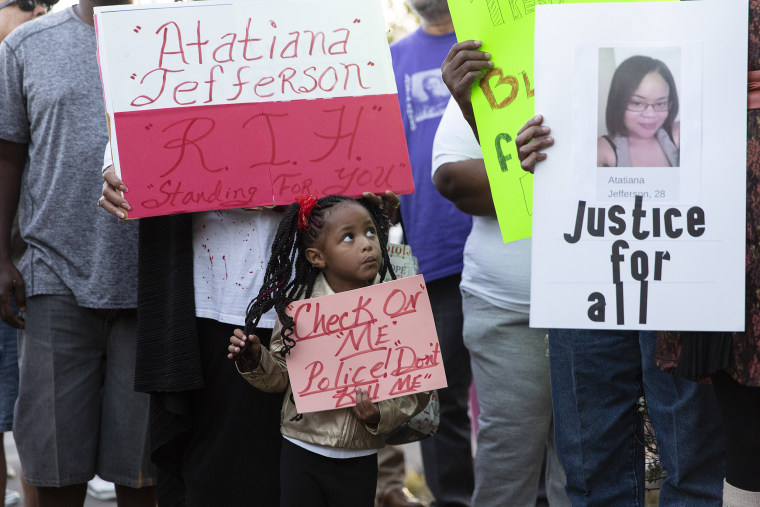Black people are not safe in this country, and we are particularly unsafe here in Fort Worth. Our lives are endangered by our own public servants, paid for out of our own pockets. Black women are not safe in any public or private space.
Black women like me, and like Jacqueline Craig, thrown to the ground outside her home by a Fort Worth police officer in December 2016 after calling the police for assistance when a neighbor assaulted her son (the neighbor was found guilty of a misdemeanor and the officer received a 10-day suspension); and like Atatiana Jefferson, killed by another Fort Worth police officer who was standing in her yard while she was still inside her home (he has been charged with murder).
Black men and boys — like Jefferson’s nephew, who witnessed his aunt being gunned down before his eyes and will be affected by that trauma for the rest of his life — are not safe.
Fort Worth police have shot and killed five black people since June 1: Cody Wayne Seals on June 1; Jaquavion Tyreke Slaton on June 9; Markevvion Devonte Cannon on July 18; Amari Malone on Aug. 21; and now Atatiana Koquice Jefferson on Oct. 12.
We are not safe, but Fort Worth is not the only place where black folks are not safe going about our daily lives or, when in extremis, are frequently at greater risk from police as first responders. As is the case throughout these dis-United States, black people are joined by brown peoples in our peril — with black and brown trans women particularly vulnerable during interactions with law enforcement. We stand in solidarity in our grief and in our rage.
Last Sunday’s evening vigil for Atatiana was our community’s primal scream. We screamed our rage at the police and at Fort Worth Mayor Betsy Price — to her face. And we screamed our rage at the systems and structures that result in unequal policing by design, that construct blackness as monstrosity, and repeat and reinforce the lethal bias that invokes terror at the sight of black skin to excuse profligate violence.
Citizens, clergy and community organizers in Fort Worth understand that Atatiana’s murder is not a single event, but clear evidence of what is wrong with policing in the United States. Her killing is not just the one-time result of a police officer who failed to identify himself, or to give her time to follow his directions before shooting her within seconds. The immediate aftermath of her death, in which the Fort Worth Police Department released the officer’s bodycam video with secondary still images of a firearm recovered at the scene was widely seen in Fort Worth’s black community as an attempt to frame her for her own murder, justifying her slaughter.
That is why, even before the arrest of the officer involved, students, pastors, activists, lawyers, community organizers and representatives — along with some police officers — gathered on Sunday under the umbrella of the Emancipate Fort Worth, which consists of a multitude of local organizations and faith groups that have been fighting for police reform at the county and city levels. Leaders and speakers were clear that they will do whatever is necessary to change the culture of policing in Fort Worth — like civil disobedience on an unprecedented scale, including a potential march and confrontation with Fort Worth police at the vigil or disruptions at city council and other meetings. It was clear to many at the vigil that only significant public pressure and economic pain will produce change in Fort Worth.
In the days since Atatiana’s murder, I have heard over and over from people that we — black folk — are not safe in Fort Worth, that black women are not safe in Fort Worth, and that is intolerable. What those in power do not understand and have not understood is that the people with whom I stood and raged and with whom I sat and strategized on Sunday do not trust the police. And now there are serious concerns that people who are victims of crime will be left without recourse because it is not safe for black folk to call the police in Fort Worth. Some are calling for internal community policing until such a time that policing in this community (and in this nation) is reformed.
Beyond that, the Tarrant County Coalition for Community Oversight along with other organizations and individuals) are calling for an effective independent community police oversight board — a project on which they have been working for since the beginning of the year, at odds with local officials. Community members are demanding the firings of City Manager David Cooke and Assistant City Manager over the police department, Jay Chapa, who they see as corrupt and incompetent and who they also hold accountable for delaying implementation of oversight. The coalition also finds the single murder charge against the officer insufficient and is pressing for secondary charges of child endangerment.
In the long term, this gathering of community leaders seeks a radical revision of policing, including a shrinking of police powers and the development of alternative resources to respond to nonemergency calls, like status checks and mental health crises. But it is important to understand that this group of leaders is focused on curbing and reforming police only because the larger issue of anti-black bigotry is beyond our ability to legislate and regulate.
CORRECTION (Oct. 17, 2019 6:03 p.m. ET): A previous version of this article misstated which organization was behind Sunday's protests. It was Emancipate Fort Worth, not the Tarrant County Coalition for Community Oversight. It also misstated how long the Tarrant County Coalition for Community Oversight had been organizing for a police oversight board. That work began this year, not years ago.



